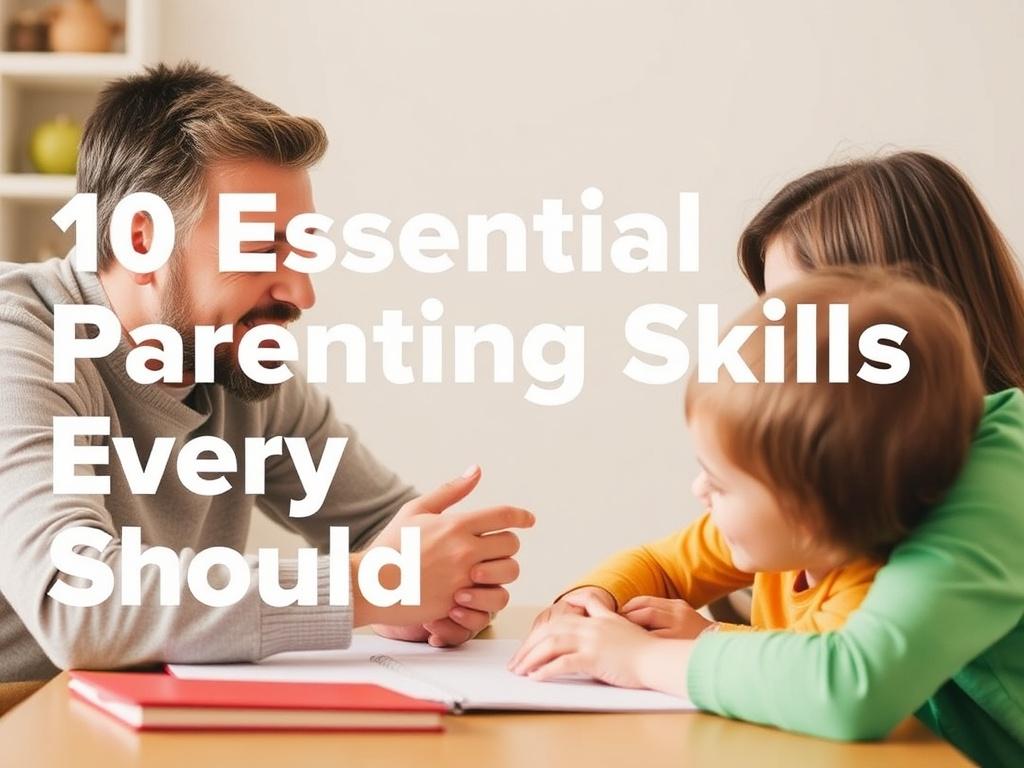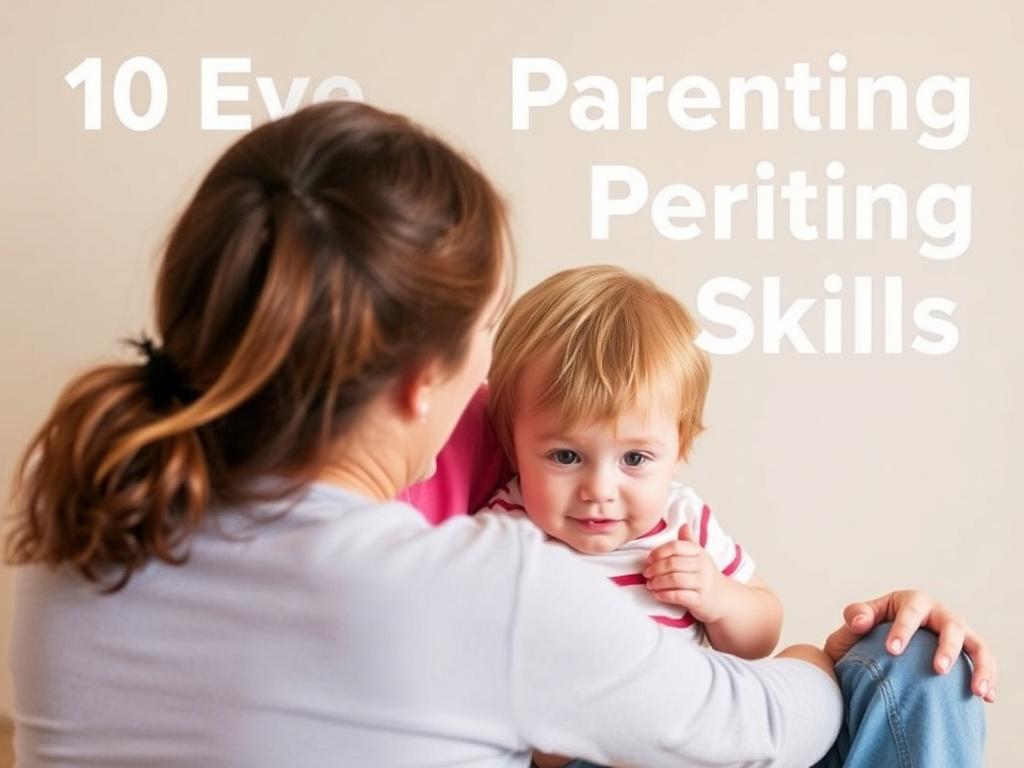SQLITE NOT INSTALLED
Parenting is one of the most rewarding yet challenging roles anyone can undertake. From the moment your child is born, you embark on an incredible journey filled with learning, growth, and sometimes confusion. Every parent wants to raise happy, healthy, and well-adjusted children, but the path to doing so is not a one-size-fits-all formula. However, there are core skills all parents should strive to master to create a nurturing environment for their kids.
In this comprehensive article, we will explore the 10 essential parenting skills every parent should master. These skills are backed by research, expert advice, and real-life experiences from parents around the world. Whether you are a first-time parent or have years of experience, brushing up on these skills can enhance your parenting style and improve your child’s development day by day.
Why Parenting Skills Matter
Parenting is not just about providing food, clothing, and shelter; it involves shaping the emotional, social, and cognitive growth of your child. Mastering key parenting skills helps you create a secure attachment, discipline effectively without causing resentment, understand your child’s needs, and foster an environment where your child feels loved and supported. The benefits of strong parenting skills extend beyond childhood and influence your child’s success in adulthood.
Parents who develop these skills feel more confident and empowered. They can navigate challenges like temper tantrums, peer pressure, and academic stress with patience and understanding. This reduces overall family conflicts and creates a more harmonious home.
Table of Contents

| Parenting Skill | Description |
|---|---|
| 1. Effective Communication | Building open and honest dialogue with your child. |
| 2. Empathy and Emotional Understanding | Recognizing and validating your child’s feelings. |
| 3. Consistent Discipline | Establishing clear rules and consequences. |
| 4. Patience | Managing your emotions and reactions calmly. |
| 5. Encouragement and Positive Reinforcement | Motivating children by praising efforts, not just outcomes. |
| 6. Setting Boundaries | Teaching limits to promote safety and respect. |
| 7. Problem Solving and Decision Making | Helping children learn strategies to resolve conflicts. |
| 8. Modeling Behavior | Demonstrating positive values through your own actions. |
| 9. Adaptability | Adjusting parenting style as your child grows. |
| 10. Self-Care and Mindfulness | Caring for your own mental and physical health. |
1. Effective Communication
Effective communication is the foundation of a strong parent-child relationship. It goes beyond just talking; it involves active listening, open dialogue, and non-verbal cues. Parents who master effective communication create an atmosphere where children feel heard, respected, and valued.
When you communicate well with your child, they are more likely to share their thoughts, feelings, and fears. This can help you identify problems early and provide the right support. For example, if a child is struggling at school or with friendships, effective communication helps uncover the root of the issue before it escalates.
Tips for developing effective communication:
- Maintain eye contact to show attention.
- Use simple, age-appropriate language.
- Ask open-ended questions to encourage elaboration.
- Avoid interrupting when your child is speaking.
- Validate your child’s feelings even if you don’t agree.
Let’s see how you can practice these tips in everyday life. Instead of asking “Did you have a good day?” which can get a simple “yes” or “no,” try “What was the best part of your day?” This invites your child to open up more deeply, helping you strengthen your bond through conversation.
2. Empathy and Emotional Understanding
Empathy is the ability to put yourself in your child’s shoes and understand their emotions. Emotional understanding involves recognizing what your child is feeling and showing kindness towards those feelings. These skills teach children emotional intelligence, which is crucial for their social skills and mental well-being.
When you respond empathetically, your child learns that their emotions are valid and manageable. For instance, instead of telling your child to “stop crying,” an empathetic response would be, “I see that you are upset—do you want to talk about what’s making you sad?”
Empathy also helps reduce tantrums and behavioral problems because children feel safe and cared for. It encourages emotional regulation, allowing children to develop resilience in the face of challenges.
- Step 1: Observe your child’s body language and tone.
- Step 2: Label the emotion you see (e.g., “You look frustrated.”)
- Step 3: Respond with understanding instead of judgment.
- Step 4: Offer comfort and solutions when appropriate.
3. Consistent Discipline
Many parents struggle with discipline because it requires a balance between setting firm boundaries and showing love. Consistent discipline means maintaining clear rules and consequences that children can rely on to understand expected behavior. This skill fosters security and predictability in your child’s world.
Inconsistency can confuse children and cause testing of limits, which may lead to defiance or anxiety. Consistent discipline is not about punishment but about teaching responsibility and respect. It encourages children to make good choices knowing the outcomes of their actions.
There are different discipline methods, but positive discipline — which involves setting limits while reinforcing good behavior — is widely recommended. Avoid harsh punishments or yelling, as these can damage trust and emotional health.
Example of Consistent Discipline Rules
| Rule | Expected Behavior | Consequences if Not Followed |
|---|---|---|
| Bedtime | Go to bed by 8:30 PM | Loss of screen time the next day |
| Homework | Complete homework before play | No video games until homework is done |
| Respect | Use polite words and no yelling | Time-out or removal from activity |
4. Patience
Patience is a virtue especially essential in parenting. Children are learning and growing, which means mistakes and slow progress are part of the process. Developing patience prevents parents from reacting impulsively or harshly, allowing for calmer guidance.
Parenting requires enduring the endless questions, the repeated behaviors, and sometimes the defiance. When you cultivate patience, you model self-control to your kids and create a more peaceful home atmosphere.
How to practice patience:
- Take deep breaths before responding to challenging behavior.
- Remind yourself that children are naturally imperfect and learning.
- Use positive self-talk such as “This too shall pass.”
- Implement regular breaks to recharge your emotional energy.
It might help to think of parenting challenges as opportunities to grow alongside your child. Each testing moment is a chance for both of you to learn vital life lessons in emotion management.
5. Encouragement and Positive Reinforcement
Children thrive on encouragement and positive reinforcement more than criticism. This essential parenting skill helps boost your child’s self-esteem and motivates good behavior by acknowledging their efforts and achievements.
Instead of focusing on mistakes or shortcomings, highlight what your child is doing well. Say things like “I’m so proud that you tried really hard on your math test!” or “You did a great job sharing your toys today.” These affirmations build a child’s confidence and willingness to try new things.
Positive reinforcement encourages intrinsic motivation, where children want to do good because they feel proud, not just to gain rewards or avoid punishment.
Examples of Positive Reinforcement
- Praise specific actions (e.g., “I appreciate how you cleaned up your room.”)
- Offer small rewards for milestones (stickers, extra storytime)
- Celebrate progress not just perfection
- Encourage a growth mindset by emphasizing effort over innate talent
6. Setting Boundaries
Setting boundaries is a vital parenting skill that helps children understand limits needed for their safety and social development. Boundaries teach respect for both themselves and others and provide structure that helps children feel secure.
Boundaries can be physical, emotional, or digital in nature. For example, teaching your child that yelling is not acceptable, or screen time has limits, are important boundaries. Children who know their limits find it easier to make good decisions in other areas of life.
Effective boundary setting involves clear explanations and consistency. Children should understand why boundaries exist and what happens if they are crossed.
7. Problem Solving and Decision Making
One of the most empowering parenting skills is teaching your child basic problem-solving and decision-making. Life is full of dilemmas and challenges that children will encounter, and equipping them with these skills early on increases their independence and confidence.
Instead of immediately solving your child’s problems, guide them through the process by asking questions like “What do you think you should do?” or “What are some ways you can solve this?” This encourages critical thinking and responsible choices.
You can use role-playing, storytelling, or real-life examples to practice problem-solving skills. Discuss the consequences of different decisions so your child understands cause and effect.
8. Modeling Behavior
Children learn more by what parents do than what they say. Modeling behavior is about demonstrating the values, manners, and habits you want to see in your child. When parents act with kindness, honesty, patience, and responsibility, children are more likely to adopt these traits.
This skill requires self-awareness and intentionality. Be mindful of how you handle stress, interactions with others, and your own self-care, as your child is always observing and absorbing these cues.
9. Adaptability
Parenting does not come with a fixed script. Each child is unique, and what works one day might not work the next. Adaptability means being flexible and open to change your parenting approach as your child grows and circumstances evolve.
For example, toddlers require different discipline than teenagers. A skillful parent adjusts expectations and strategies accordingly, monitoring what resonates best with their child’s personality and needs.
Adaptability goes hand-in-hand with patience and continuous learning. The best parents maintain curiosity about child development and seek resources or support when needed.
10. Self-Care and Mindfulness
Finally, one of the most overlooked yet essential parenting skills is caring for yourself. Parenting can be exhausting, stressful, and overwhelming at times. Without self-care, parents risk burnout, which negatively affects their ability to nurture their children effectively.
Mindfulness techniques such as meditation, deep breathing, or simply taking quiet moments help reduce stress and promote emotional balance. Additionally, prioritizing sleep, nutrition, exercise, and social connection keeps your energy levels stable.
Remember, you cannot pour from an empty cup. By practicing self-care, you model healthy habits for your children and sustain your capacity to be a loving, present parent.
Summary: Mastering the 10 Essential Parenting Skills
To wrap up, here’s a quick review of the 10 essential parenting skills every parent should master:
- Effective Communication
- Empathy and Emotional Understanding
- Consistent Discipline
- Patience
- Encouragement and Positive Reinforcement
- Setting Boundaries
- Problem Solving and Decision Making
- Modeling Behavior
- Adaptability
- Self-Care and Mindfulness
Each one is a building block that strengthens your relationship with your child and supports their well-being. By intentionally practicing these skills, parents create an environment where children thrive emotionally, socially, and intellectually.
Additional Resources

If you’re eager to deepen your knowledge and practice these skills, consider the following books and websites recommended by parenting experts:
- Books:
- “How to Talk So Kids Will Listen & Listen So Kids Will Talk” by Adele Faber and Elaine Mazlish
- “The Whole-Brain Child” by Daniel J. Siegel and Tina Payne Bryson
- “Positive Discipline” by Jane Nelsen
- Websites:
- Zero to Three – Early childhood development resources
- Aha! Parenting – Guidance and tips on effective parenting
- Parenting.org – General parenting support
Closing Thoughts

Parenting is a lifelong adventure filled with ups and downs. No one is perfect, but with intentional practice and patience, every parent can master these essential parenting skills. Remember to celebrate the small victories and seek support when you need it. Your commitment to mastering these skills not only transforms your child’s life but enriches your own in ways you’ve never imagined.
Feel encouraged, motivated, and ready to embrace this incredible role fully. The journey may have its challenges, but mastering these ten essential parenting skills will ensure a more joyful, peaceful, and loving family life for you and your children.
